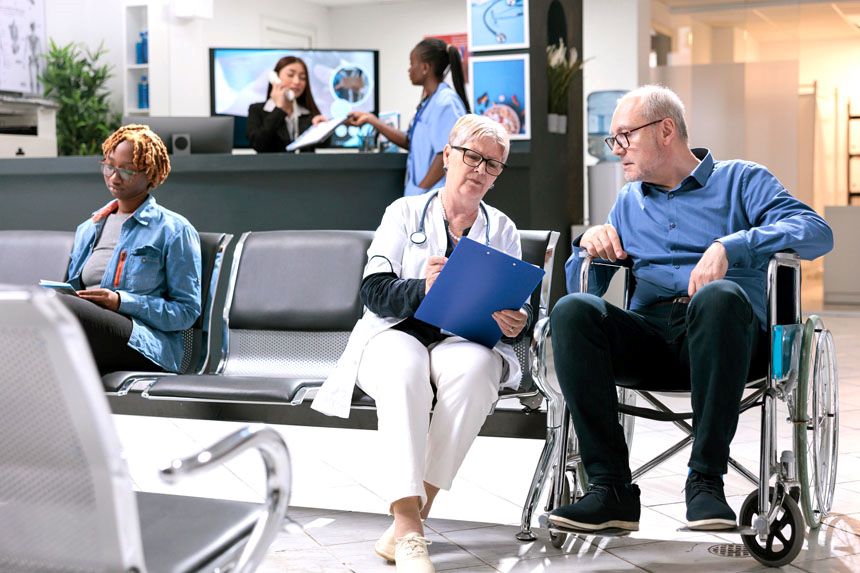Recognizing and understanding shifts in procedure trends is vital to building a winning strategy in today’s healthcare market.
If the past few years have shown us anything, it’s that the moment we start to assume something is stable, it reveals itself as anything but. Some trends turn out to be temporary blips, and others quickly become the status quo.
According to our claims data, one transition that doesn’t appear to be that temporary is the shifting center of care for surgical procedures from hospitals to ambulatory surgery centers (ASCs).
What is an ambulatory surgery center?
Created in 1970, ambulatory surgery centers are modern healthcare facilities that provide same-day surgical care for procedures that do not require hospital admission. ASCs are highly regulated by states and by CMS to ensure high-quality care. The combination of high-quality care and lower costs makes them an attractive alternative to traditional hospitals for patients and health systems.
Shifting from hospitals to ASCs
As a percentage of total outpatient surgical claims, procedures performed at an ASC have been steadily increasing. ASCs accounted for 14.3% of total outpatient surgical claims in 2019 vs 17.1% so far in 2022.
Meanwhile, outpatient surgical procedures performed at a hospital have been in decline: 50.0% in 2019 vs 47.8% so far in 2022.
In 2022, the monthly average number of ASC outpatient surgical claims appears to have declined slightly compared to 2021 (1% decrease), while claims at hospitals have declined by 9%.
Although both decreased, the more significant decline in hospital claims year-over-year continues to support the shift in care.
What is driving the shift from hospitals to ambulatory surgery centers?
So, what’s driving the increase in ASC volume? One piece of the puzzle is that these facilities are taking on the volume of patients from the hospitals unable to see them during the pandemic. During the peak of the pandemic, many hospitals paused elective surgeries to focus on providing care to COVID-19 patients. As a result, many patients in need of surgeries sought care at ASCs instead.
However, this only accounts for a portion of those patients seeking care elsewhere. If it were the sole reason for the shift, we would expect to see the volume shift back to hospital-based procedures once hospitals opened their doors to non-COVID-19 patients again.
COVID-19 accelerated the transition many patients were already making for outpatient surgeries. ASCs offer patients high-quality care at lower costs, which makes them an attractive alternative to visiting a hospital for outpatient surgeries.
What’s even more interesting is that many of these ASCs are owned by health systems.
As costs increase to deliver care in traditional environments and people move from cities to suburban and rural settings, health systems need to create alternative sources of revenue and new sites of care closer to where their patients live. In fact, our hospital and ASC databases show that health systems own more than 5,000 ASCs.
How the shifting care setting is reshaping the medical device industry
Understanding this market shift is incredibly important for anyone selling into the traditional hospital surgical setting, particularly those in the medical device field.
As ASCs grow in popularity and continue to take on more procedures, medical device companies may need to adjust their sales and marketing strategy to target the ASC market. ASCs present a new and potentially major market for medical device companies.
Companies looking to target the ASC market need healthcare commercial intelligence to gain context on the trends shaping the healthcare market. The right data and analytics will enable them to develop better sales strategies and marketing campaigns and ultimately sell more devices.
What procedures are done at ASCs?
ASCs provide a wide range of procedures—from colonoscopies to cataract removals. Another common outpatient procedure is shoulder surgery. Definitive Healthcare data reveals that 671,062 outpatient shoulder surgeries were performed in ASCs in 2021, compared to only 390,523 in hospitals.
Learn more
Want to learn more about how Definitive Healthcare can provide the healthcare commercial intelligence medical device companies need to navigate a shifting landscape? Request a free trial today.
Updated January 2023





